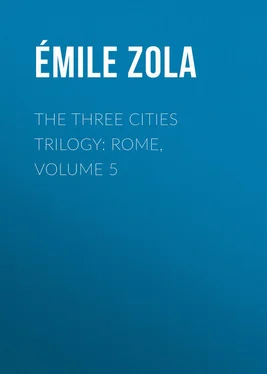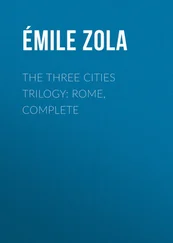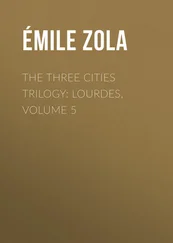Émile Zola - The Three Cities Trilogy - Rome, Volume 5
Здесь есть возможность читать онлайн «Émile Zola - The Three Cities Trilogy - Rome, Volume 5» — ознакомительный отрывок электронной книги совершенно бесплатно, а после прочтения отрывка купить полную версию. В некоторых случаях можно слушать аудио, скачать через торрент в формате fb2 и присутствует краткое содержание. Жанр: literature_19, foreign_antique, foreign_prose, на английском языке. Описание произведения, (предисловие) а так же отзывы посетителей доступны на портале библиотеки ЛибКат.
- Название:The Three Cities Trilogy: Rome, Volume 5
- Автор:
- Жанр:
- Год:неизвестен
- ISBN:нет данных
- Рейтинг книги:3 / 5. Голосов: 1
-
Избранное:Добавить в избранное
- Отзывы:
-
Ваша оценка:
- 60
- 1
- 2
- 3
- 4
- 5
The Three Cities Trilogy: Rome, Volume 5: краткое содержание, описание и аннотация
Предлагаем к чтению аннотацию, описание, краткое содержание или предисловие (зависит от того, что написал сам автор книги «The Three Cities Trilogy: Rome, Volume 5»). Если вы не нашли необходимую информацию о книге — напишите в комментариях, мы постараемся отыскать её.
The Three Cities Trilogy: Rome, Volume 5 — читать онлайн ознакомительный отрывок
Ниже представлен текст книги, разбитый по страницам. Система сохранения места последней прочитанной страницы, позволяет с удобством читать онлайн бесплатно книгу «The Three Cities Trilogy: Rome, Volume 5», без необходимости каждый раз заново искать на чём Вы остановились. Поставьте закладку, и сможете в любой момент перейти на страницу, на которой закончили чтение.
Интервал:
Закладка:
In this wise, in Pierre's mind there spread out the whole history of the popes, the most prodigious of all histories, showing fortune in every guise, the lowest, the most wretched, as well as the loftiest and most dazzling; whilst an obstinate determination to live enabled the papacy to survive everything – conflagrations, massacres, and the downfall of many nations, for always did it remain militant and erect in the persons of its popes, that most extraordinary of all lines of absolute, conquering, and domineering sovereigns, every one of them – even the puny and humble – masters of the world, every one of them glorious with the imperishable glory of heaven when they were thus evoked in that ancient Vatican, where their spirits assuredly awoke at night and prowled about the endless galleries and spreading halls in that tomb-like silence whose quiver came no doubt from the light touch of their gliding steps over the marble slabs.
However, Pierre was now thinking that he indeed knew which of the great popes Leo XIII most desired to resemble. It was first Gregory the Great, the conqueror and organiser of the early days of Catholic power. He had come of ancient Roman stock, and in his heart there was a little of the blood of the emperors. He administered Rome after it had been saved from the Goths, cultivated the ecclesiastical domains, and divided earthly wealth into thirds, one for the poor, one for the clergy, and one for the Church. Then too he was the first to establish the Propaganda, sending his priests forth to civilise and pacify the nations, and carrying his conquests so far as to win Great Britain over to the divine law of Christ. And the second pope whom Leo XIII took as model was one who had arisen after a long lapse of centuries, Sixtus V, the pope financier and politician, the vine-dresser's son, who, when he had donned the tiara, revealed one of the most extensive and supple minds of a period fertile in great diplomatists. He heaped up treasure and displayed stern avarice, in order that he might ever have in his coffers all the money needful for war or for peace. He spent years and years in negotiations with kings, never despairing of his own triumph; and never did he display open hostility for his times, but took them as they were and then sought to modify them in accordance with the interests of the Holy See, showing himself conciliatory in all things and with every one, already dreaming of an European balance of power which he hoped to control. And withal a very saintly pope, a fervent mystic, yet a pope of the most absolute and domineering mind blended with a politician ready for whatever courses might most conduce to the rule of God's Church on earth.
And, after all, Pierre amidst his rising enthusiasm, which despite his efforts at calmness was sweeping away all prudence and doubt, Pierre asked himself why he need question the past. Was not Leo XIII the pope whom he had depicted in his book, the great pontiff, who was desired and expected? No doubt the portrait which he had sketched was not accurate in every detail, but surely its main lines must be correct if mankind were to retain a hope of salvation. Whole pages of that book of his arose before him, and he again beheld the Leo XIII that he had portrayed, the wise and conciliatory politician, labouring for the unity of the Church and so anxious to make it strong and invincible against the day of the inevitable great struggle. He again beheld him freed from the cares of the temporal power, elevated, radiant with moral splendour, the only authority left erect above the nations; he beheld him realising what mortal danger would be incurred if the solution of the social question were left to the enemies of Christianity, and therefore resolving to intervene in contemporary quarrels for the defence of the poor and the lowly, even as Jesus had intervened once before. And he again beheld him putting himself on the side of the democracies, accepting the Republic in France, leaving the dethroned kings in exile, and verifying the prediction which promised the empire of the world to Rome once more when the papacy should have unified belief and have placed itself at the head of the people. The times indeed were near accomplishment, Caesar was struck down, the Pope alone remained, and would not the people, the great silent multitude, for whom the two powers had so long contended, give itself to its Father now that it knew him to be both just and charitable, with heart aglow and hand outstretched to welcome all the penniless toilers and beggars of the roads! Given the catastrophe which threatened our rotten modern societies, the frightful misery which ravaged every city, there was surely no other solution possible: Leo XIII, the predestined, necessary redeemer, the pastor sent to save the flock from coming disaster by re-establishing the true Christian community, the forgotten golden age of primitive Christianity. The reign of justice would at last begin, all men would be reconciled, there would be but one nation living in peace and obeying the equalising law of work, under the high patronage of the Pope, sole bond of charity and love on earth!
And at this thought Pierre was upbuoyed by fiery enthusiasm. At last he was about to see the Holy Father, empty his heart and open his soul to him! He had so long and so passionately looked for the advent of that moment! To secure it he had fought with all his courage through ever recurring obstacles, and the length and difficulty of the struggle and the success now at last achieved, increased his feverishness, his desire for final victory. Yes, yes, he would conquer, he would confound his enemies. As he had said to Monsignor Fornaro, could the Pope disavow him? Had he not expressed the Holy Father's secret ideas? Perhaps he might have done so somewhat prematurely, but was not that a fault to be forgiven? And then too, he remembered his declaration to Monsignor Nani, that he himself would never withdraw and suppress his book, for he neither regretted nor disowned anything that was in it. At this very moment he again questioned himself, and felt that all his valour and determination to defend his book, all his desire to work the triumph of his belief, remained intact. Yet his mental perturbation was becoming great, he had to seek for ideas, wondering how he should enter the Pope's presence, what he should say, what precise terms he should employ. Something heavy and mysterious which he could hardly account for seemed to weigh him down. At bottom he was weary, already exhausted, only held up by his dream, his compassion for human misery. However, he would enter in all haste, he would fall upon his knees and speak as he best could, letting his heart flow forth. And assuredly the Holy Father would smile on him, and dismiss him with a promise that he would not sign the condemnation of a work in which he had found the expression of his own most cherished thoughts.
Then, again, such an acute sensation as of fainting came over Pierre that he went up to the window to press his burning brow against the cold glass. His ears were buzzing, his legs staggering, whilst his brain throbbed violently. And he was striving to forget his thoughts by gazing upon the black immensity of Rome, longing to be steeped in night himself, total, healing night, the night in which one sleeps on for ever, knowing neither pain nor wretchedness, when all at once he became conscious that somebody was standing behind him; and thereupon, with a start, he turned round.
And there, indeed, stood Signor Squadra in his black livery. Again he made one of his customary bows to invite the visitor to follow him, and again he walked on in front, crossing the little throne-room, and slowly opening the farther door. Then he drew aside, allowed Pierre to enter, and noiselessly closed the door behind him.
Pierre was in his Holiness's bed-room. He had feared one of those overwhelming attacks of emotion which madden or paralyse one. He had been told of women reaching the Pope's presence in a fainting condition, staggering as if intoxicated, while others came with a rush, as though upheld and borne along by invisible pinions. And suddenly the anguish of his own spell of waiting, his intense feverishness, ceased in a sort of astonishment, a reaction which rendered him very calm and so restored his clearness of vision, that he could see everything. As he entered he distinctly realised the decisive importance of such an audience, he, a mere petty priest in presence of the Supreme Pontiff, the Head of the Church. All his religious and moral life would depend on it; and possibly it was this sudden thought that thus chilled him on the threshold of the redoubtable sanctuary, which he had approached with such quivering steps, and which he would not have thought to enter otherwise than with distracted heart and loss of senses, unable to do more than stammer the simple prayers of childhood.
Читать дальшеИнтервал:
Закладка:
Похожие книги на «The Three Cities Trilogy: Rome, Volume 5»
Представляем Вашему вниманию похожие книги на «The Three Cities Trilogy: Rome, Volume 5» списком для выбора. Мы отобрали схожую по названию и смыслу литературу в надежде предоставить читателям больше вариантов отыскать новые, интересные, ещё непрочитанные произведения.
Обсуждение, отзывы о книге «The Three Cities Trilogy: Rome, Volume 5» и просто собственные мнения читателей. Оставьте ваши комментарии, напишите, что Вы думаете о произведении, его смысле или главных героях. Укажите что конкретно понравилось, а что нет, и почему Вы так считаете.












